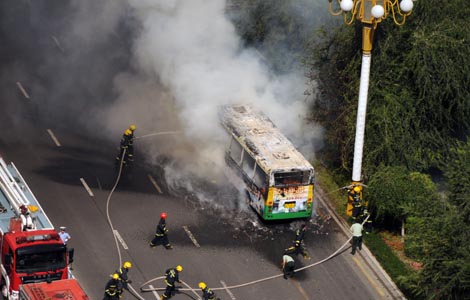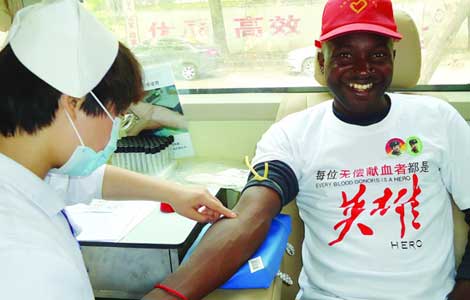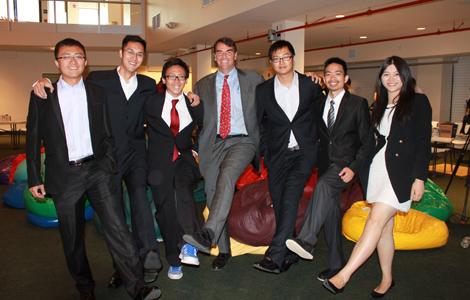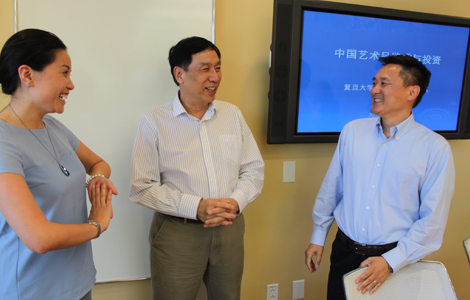After the crash: a legal morass of tough choices
Updated: 2013-08-06 11:00
By Chen Jia in San Francisco (China Daily)
|
||||||||
Lawyers sort out Asiana 214 liabilities
US law firms are lining up for Chinese clients who survived the Asiana flight 214 crash-landing in San Francisco a month ago and now want legal help across the Pacific Ocean.
Eight students and teachers from Taiyuan, Shanxi province, who were on board the doomed flight signed a letter of intent with US law firm Herrmann Scholbe and its Chinese partner on Sunday.
Attorney Charles Herrmann of Herrmann Scholbe told China Daily on Monday that "Chinese victims living in China who bought round trip tickets back to China have only China or Korea to sue Asiana."
He said all passengers may sue equipment manufacturers such as Boeing and, perhaps even more importantly in this case, air traffic controllers.
Asiana flight 214 crashed on July 6 landing at San Francisco International Airport with 307 passengers and crew aboard. Of the Chinese passengers, 141 have been accounted for, including three teenage girls - two who were killed in the accident and one who died days later in the hospital.
One of the passengers - a Chinese Canadian - has been the first to file a lawsuit against Asiana in US District Court for $5 million, as reported by the San Jose Mercury News on July 31.
Henry Xie, a professor at the University of Shanghai, was on the flight to visit his son who works for Apple Inc in Silicon Valley. Xie was treated as an outpatient at Stanford medical center of Stanford.
According to the report, Xie's lawyer said that because the son had bought the round-trip ticket for his father in California, it gave Xie legal status in US courts, under an exemption in international agreements that limit legal actions by foreigners.
"While he is a resident of Shanghai and actually a Canadian citizen, since the ticket was purchased in the US by his son, that gives him the option of suing Asiana in the US," Verna was quoted as saying. "It's a technical, legal issue. But it's very significant."
The report went on to say that Xie would be barred from suing South Korea-based Asiana in US courts because of an Montreal Convention international treaty, which would limit any settlement to no more than about $135,000 in China, where he is from, or in South Korea, where Asiana is based.
However, Charles Herrmann argues on Monday that the Montreal Convention in no way limits passenger cases against Asiana to $135,000 figure.
"That figure bears no relation to reality," Herrmann said, providing Asiana can prove a complete lack of negligence on its part.
It may then limit its liability to passengers to slightly over $170,000, he said.
He went on to say that it is "totally inapplicable" in this case, because it is overwhelmingly obvious that the Asiana crew made huge mistakes, so the limit has no bearing on this case whatsoever, regardless of which country the passenger chooses to sue in.
"We wish the best for Mr Xie but do not believe his lawsuit will have an influence on other cases because each case may be different depending upon a number of factors including, among other things, the passenger's travel plans, itinerary on the ticket, where the ticket was purchased and where the passenger resides," Brian Alexander, a partner at Kreindler & Kreindler LLP, told China Daily on Monday.
Kreindler has been retained by the families of the three students who died, as well as some other foreign passengers.
"Like Mr Xie, many of our clients will be able to bring lawsuits against Asiana in the US. There is no special exemption in his case, he is simply suing under the rules that apply to his ticket purchase under the Montreal Convention," he said.
Based on information from his clients, Alexander said there are other Chinese citizens who purchased tickets which will allow them to similarly proceed in the US.
"Significantly, in foreign passenger cases where there may not be US jurisdiction against Asiana under the Montreal Convention, passenger claims will still be pursued for full compensation against Asiana by alternate strategies," he said.
To the extent there are other responsible parties in the US and elsewhere - they will be pursued so that all passengers will have an opportunity to obtain full, fair and just compensation for their injuries and damages under the applicable law, he said.
"We have already begun our efforts in this regard on behalf of our many clients from the US, China and Korea," he said.
chenjia@chinadailyusa.com
(China Daily USA 08/06/2013 page2)
- Asiana Flight 214 aftermath: ceremonies, tears and lawsuits
- Families of crash victims to sue Asiana in the US
- Asiana crash victims' ashes returned to relatives
- Coroner confirms: Asiana survivor killed by fire truck
- Asiana legal fallout begins after deadly crash
- Asiana 214 survivors get legal advice
- Asiana crash passengers sue Boeing

 First taste of test-tube burger close to meat
First taste of test-tube burger close to meat
 Govt urged to take care of parents who lose child
Govt urged to take care of parents who lose child
 1 dead, dozens injured in Urumqi bus fire
1 dead, dozens injured in Urumqi bus fire
 Lei Feng's African brother
Lei Feng's African brother
 EU SMEs target niche markets in China
EU SMEs target niche markets in China
 British couple caring for special children
British couple caring for special children
 Fly for adventure at US air show
Fly for adventure at US air show
 Kobe Byrant meets fans in Shenzhen
Kobe Byrant meets fans in Shenzhen
Most Viewed
Editor's Picks

|

|

|

|

|

|
Today's Top News
After the crash: a legal morass of tough choices
US plays catch up in Africa
China's C919 to break Boeing, Airbus dominance
Brunei bans tainted Fonterra dairy products
7 arrested for polluting S China river
Dialogue defuses EU, China solar case
Drifting left, Asian American voters still back John Liu
Beijing sincere on S China Sea Code of Conduct
US Weekly

|

|





